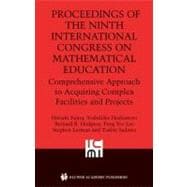
What is included with this book?
| Preface | xi | ||||
| Presidential Address at the Opening Ceremony of ICME | xv | ||||
| International Round Table: The Role of Mathematics in General Education for the 21st Century | 2 | (16) | |||
| Plenary Lectures | 18 | (73) | |||
|
|||||
|
19 | (18) | |||
|
|||||
|
37 | (21) | |||
|
|||||
|
58 | (15) | |||
|
|||||
|
73 | (18) | |||
| Regular Lectures | 91 | (128) | |||
|
|||||
|
92 | (3) | |||
|
|||||
|
95 | (2) | |||
|
|||||
|
97 | (3) | |||
|
|||||
|
100 | (2) | |||
|
|||||
|
102 | (3) | |||
|
|||||
|
105 | (3) | |||
|
|||||
|
108 | (3) | |||
|
|||||
|
111 | (2) | |||
|
|||||
|
113 | (2) | |||
|
|||||
|
115 | (3) | |||
|
|||||
|
118 | (3) | |||
|
|||||
|
121 | (3) | |||
|
|||||
|
124 | (2) | |||
|
|||||
|
126 | (2) | |||
|
|||||
|
128 | (3) | |||
|
|||||
|
131 | (2) | |||
|
|||||
|
133 | (2) | |||
|
|||||
|
135 | (1) | |||
|
|||||
|
136 | (3) | |||
|
|||||
|
139 | (3) | |||
|
|||||
|
142 | (2) | |||
|
|||||
|
144 | (2) | |||
|
|||||
|
146 | (2) | |||
|
|||||
|
148 | (3) | |||
|
|||||
|
151 | (2) | |||
|
|||||
|
153 | (2) | |||
|
|||||
|
155 | (2) | |||
|
|||||
|
157 | (2) | |||
|
|||||
|
159 | (3) | |||
|
|||||
|
162 | (3) | |||
|
|||||
|
165 | (3) | |||
|
|||||
|
168 | (3) | |||
|
|||||
|
171 | (3) | |||
|
|||||
|
174 | (3) | |||
|
|||||
|
177 | (2) | |||
|
|||||
|
179 | (2) | |||
|
|||||
|
181 | (3) | |||
|
|||||
|
184 | (2) | |||
|
|||||
|
186 | (2) | |||
|
|||||
|
188 | (2) | |||
|
|||||
|
190 | (2) | |||
|
|||||
|
192 | (3) | |||
|
|||||
|
195 | (2) | |||
|
|||||
|
197 | (3) | |||
|
|||||
|
200 | (3) | |||
|
|||||
|
203 | (2) | |||
|
|||||
|
205 | (2) | |||
|
|||||
|
207 | (3) | |||
|
|||||
|
210 | (2) | |||
|
|||||
|
212 | (1) | |||
|
|||||
|
213 | (3) | |||
|
|||||
|
216 | (3) | |||
| Working Groups for Action | 219 | (73) | |||
|
220 | (6) | |||
|
226 | (6) | |||
|
232 | (6) | |||
|
238 | (5) | |||
|
243 | (5) | |||
|
248 | (5) | |||
|
253 | (5) | |||
|
258 | (6) | |||
|
264 | (6) | |||
|
270 | (3) | |||
|
273 | (5) | |||
|
278 | (9) | |||
|
287 | (5) | |||
| Topic Study Groups | 292 | (77) | |||
|
293 | (4) | |||
|
297 | (3) | |||
|
300 | (3) | |||
|
303 | (4) | |||
|
307 | (2) | |||
|
309 | (4) | |||
|
313 | (3) | |||
|
316 | (3) | |||
|
319 | (4) | |||
|
323 | (2) | |||
|
325 | (2) | |||
|
327 | (4) | |||
|
331 | (4) | |||
|
335 | (4) | |||
|
339 | (4) | |||
|
343 | (4) | |||
|
347 | (3) | |||
|
350 | (2) | |||
|
352 | (2) | |||
|
354 | (3) | |||
|
357 | (4) | |||
|
361 | (4) | |||
|
365 | (4) | |||
| Presentation by Distribution and Reports on Working Groups | 369 | (2) | |||
|
370 | (1) | |||
| ICMI Studies | 371 | (7) | |||
|
372 | (2) | |||
|
374 | (4) | |||
| Affiliated Study Groups | 378 | (8) | |||
|
379 | (1) | |||
|
380 | (2) | |||
|
382 | (2) | |||
|
384 | (2) | |||
| The Forum of All Chinese Mathematics Educators at ICME 9 | 386 | (5) | |||
| Secretary's Closing Remarks | 391 | (10) | |||
| List of Participants | 401 |
The New copy of this book will include any supplemental materials advertised. Please check the title of the book to determine if it should include any access cards, study guides, lab manuals, CDs, etc.
The Used, Rental and eBook copies of this book are not guaranteed to include any supplemental materials. Typically, only the book itself is included. This is true even if the title states it includes any access cards, study guides, lab manuals, CDs, etc.